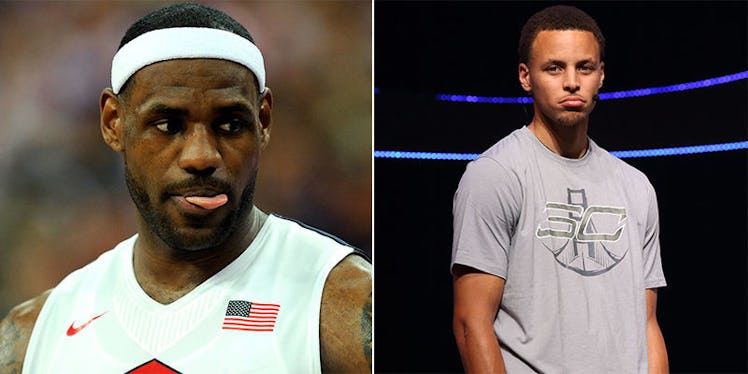
Why People Calling LeBron 'Salty' For His Comments On Steph Curry Are Wrong
When LeBron James spoke his opinion on Stephen Curry's latest MVP award win, it was easy to anticipate what some fans' reactions would be.
After LeBron said,
I think sometimes the word 'valuable' or best player of the year you can have different results. You know, that's not taking anything from anyone that's ever won the award.
He also added,
Look at Steph's numbers. He averaged 30, he led the league in steals, he was 90-50-40 [shooting percentages from the free throw line, field and beyond the 3-point line], and they won 73 [games]. So, I don't -- do you have any debate over that, really, when it comes to that award? But when you talk about most 'valuable,' then you can have a different conversation. So take nothing away from him. He's definitely deserving of that award, for sure.
All at once, LeBron essentially questioned three things: the meaning of the "Most Valuable Player" award, how we interpret that meaning and whether our interpretation actually matches up with the athlete who wins it.
Because the comment came in the wake of Curry's MVP win, which was a unanimous decision, the conclusion for some to make was simple.
LeBron is jealous. LeBron is mad. LeBron is definitely salty.
And it's easy to understand why calling LeBron "salty" is such a popular response.
To be frank, any comment from LeBron that began along the lines of "Congrats Steph, BUT..." was obviously going to sound less like a wise opinion and more like Kanye's "I'ma let you finish" rant.
But there's just one little detail that's playing in LeBron's favor: He's absolutely right.
The way the league's MVP trophy is awarded has never felt like a consistent process. Just look at the players who've won it in the last decade.
Kobe Bryant scored over 35 points per game during the 2005-06 season, the highest average since Michael Jordan's 1986-87 campaign. The 05-06 was also the year Kobe scored 81 points in a single game.
The Lakers third and fourth best scorers that season were Smush Parker and Kwame Brown. In other words, besides Lamar Odom, Kobe was playing with nobodies.
And you could easily argue as he excelled, Kobe was much more valuable to his team than any other player in the league.
But Steve Nash was the leader of a Phoenix Suns team that was the most fun squad on the court, revolutionized basketball and excited more people on a nightly basis than the Lakers.
Nash ended up winning the award.
During the 2007-08 season, LeBron James won the scoring title with an average of 30 points per game. You could easily argue as a player who could play multiple positions and kill it as a passer, rebounder and defender, LeBron was much more valuable to his team than any other player.
But Kobe was leading the renaissance of the Los Angeles Lakers and had yet to earn his first MVP trophy at that point. That felt like the right time to do it, and so it was done.
Kobe ended up winning the award.
Last year James Harden carried a team that was highly skilled at shooting three-pointers, close-range shots and getting to the free-throw line by excelling in those specific areas himself.
You could easily argue as a man on a team whose second-best player (Dwight Howard) was injured for most of the season, James Harden, who led the Rockets to a no. 2 seed in the West last season, was more valuable to his team than any other player.
You could also argue as a player on a team that didn't have the Executive of the Year, a Coach of the Year candidate or Defensive Player of the Year candidate, Harden's work last season was most impressive.
But Steph Curry, who had all those luxuries, had shifted the paradigm of what a dominant athlete looks like. He broke new ground in basketball, along with a Warriors team that lived by the three and did not die.
Curry, of course, won the award instead.
Even this year's selection seems strange, not because of the player who won, but because of the margin of victory.
Steph Curry is the first unanimously voted MVP in NBA history, and yet there are very credible arguments out that claim Draymond Green is the most important player for the Warriors.
The common thread between those three prominent examples is not hard to find. With each, there's some type of variable that swayed the voting.
How players make us feel, how we feel about them and their stories -- those things, which are essentially just emotions, inevitably play a part in who we deem a worthy MVP.
And when those variables change from year to year, as emotions always do, it's fair to question how exactly we define a Most Valuable Player, especially in the clear absence of a consistent set of criteria.
So for now, like LeBron said, the definition is open to interpretation.